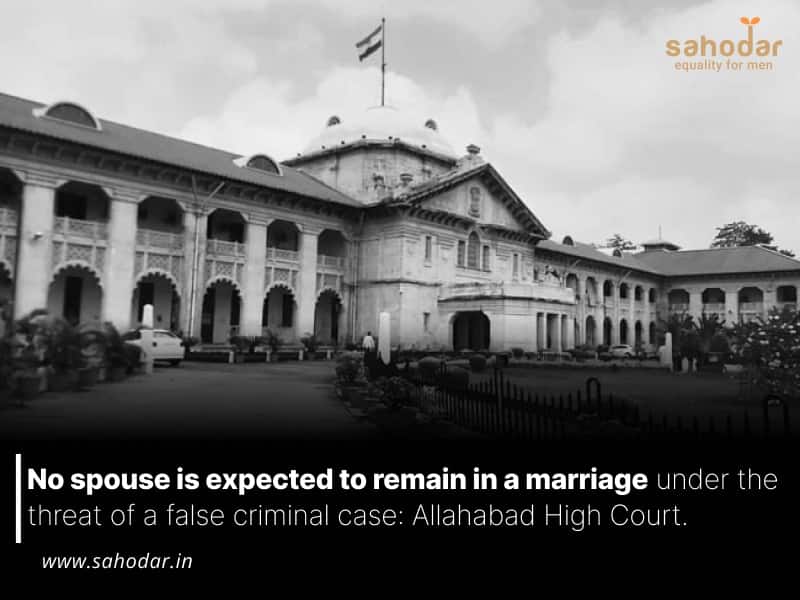The Court was dealing with a case where it found that a woman had made reckless allegations of dowry harassment case against her estranged husband, who sought a divorce.
The Allahabad High Court recently noted that no spouse, regardless of gender, is expected to remain in a marriage under the threat of malicious criminal prosecution.
The Division Bench, comprising Justices Donadi Ramesh and Saumitra Dayal Singh, made this observation in a case where a man (the appellant) sought a divorce from his estranged wife on the grounds of desertion and cruelty.
The appellant argued that his wife had falsely accused him of cruelty and dowry harassment in a criminal case. However, the wife’s brother testified that no dowry demand had ever been made.
The Court found that the wife’s reckless allegations against her husband and his family, including minor siblings, constituted extreme cruelty.
As a result, the Court granted the appellant a divorce, noting,
“Legally, no spouse whether male or female may be expected to continue in a matrimonial relationship at the risk of malicious criminal prosecution. Criminal prosecution certainly leads to loss of dignity and reputation, besides other consequences that may arise, if a person is arrested or tried for the offence alleged.”
The Court made these observations while hearing appeals filed by the man against two orders issued by a family court.
In one order, the trial court rejected his divorce petition, and in the other, it ordered the restitution of conjugal rights in favor of his estranged wife.
The couple had married in 1992, but after about two years of contentious cohabitation, the wife left her husband’s home in 1995 and moved in with her parents.
The Court was informed that despite the husband’s (appellant’s) efforts, the couple was unable to reconcile, leading him to file for divorce in 1999.
Following the initiation of divorce proceedings, the wife lodged a criminal case against her husband, accusing him of offences under Sections 498A (cruelty) and 406 (criminal breach of trust) of the Indian Penal Code (IPC) and the Dowry Prohibition Act.
In 2010, after the family court dismissed his plea, the man approached the High Court seeking a divorce.
The High Court took into account the long period of separation between the spouses and observed that a complete denial of companionship to one’s spouse, without a valid reason, could itself constitute cruelty.
It emphasized that cruelty is not solely determined by the lack of cohabitation or physical intimacy and that such a standard may be regressive and outdated.
At the same time, any person who enters into matrimonial relationship, does undertake a social and personal obligation to enjoy and share his / her company with their chosen spouse,” the Court added.
The Court observed that a Hindu marriage is a sacrament, not merely a social contract. When one partner abandons the other without justifiable reason, the sacrament loses its essence and spirit, the Court noted.
“That death of the spirit and soul of a Hindu marriage may constitute cruelty to the spouse who may be thus left alone, devoid not only of physical company but also completely deprived of company of their spouse, at all planes of human existence,” the Court noted.
The Court noted that it has been 29 years since the appellant’s wife deserted him.
It further observed that the wife’s (respondent’s) extremely cruel behavior towards the husband and his family created a reasonable fear that continuing to live with her could be harmful.
The High Court also pointed out that the trial court had overlooked these factors when it dismissed the husband’s divorce petition.
As a result, the High Court overturned the trial court’s orders and dissolved the marriage between the parties.

